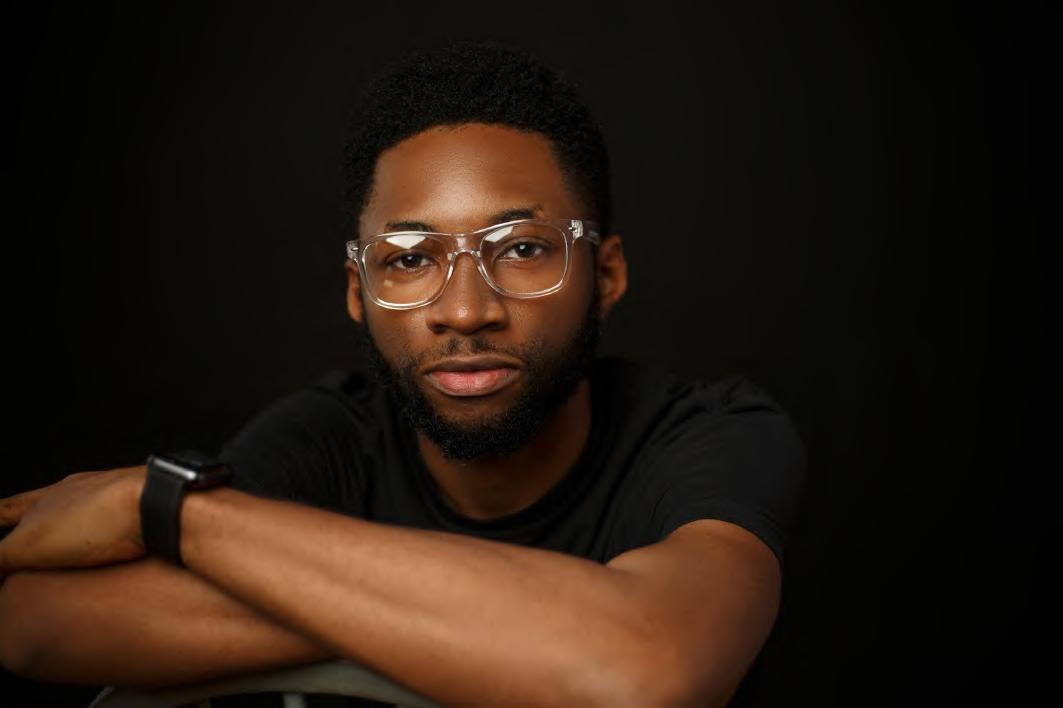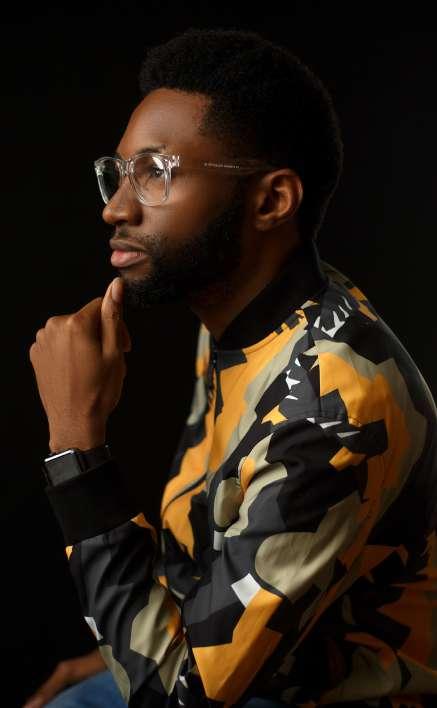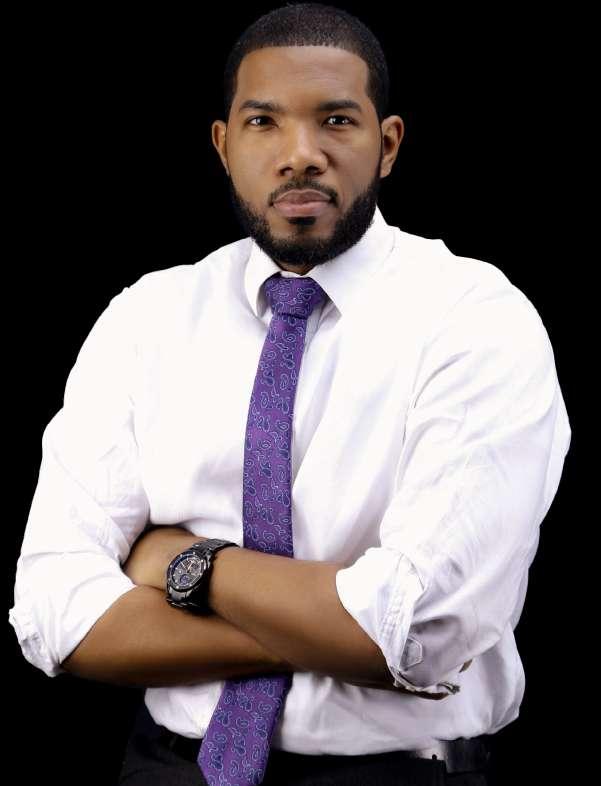
12 minute read
Evans Akanno: Building Thriving Brands Against All Odds
Evans Akanno, 31, grew up in Africa’s commercial hub, Lagos, Nigeria. He found his passion for technological design whilst interning at the Nigerian Petroleum Resources (NNPC - NipeX) in 2008.
After graduating in 2010 with a BSc in Industrial Chemistry from Imo State University, it was Evans against the unemployment plague ravaging the nation. In a move to earn from his passion, he started designing profile photos for people to use on their Blackberry Messenger (BBM), charging as little as N400 ($0.97). This endeavour foretold Evans’ potential to do great things in the entrepreneurial world.
Advertisement
Evans was on a path to launch several businesses, but the corporate world also had its doors wide open to him. He got a job as a brand and social media strategist with Jumia Nigeria in 2012 and worked with Konga in 2013 as a Creative Strategist. However, his entrepreneurial zeal still outshone these vibrant workplaces.
In 2015, Evans founded Cregital, a digital solutions company that designs and builds websites and digital platforms for businesses across Africa. He bootstrapped the business with just $1,600 and has grown it into a multi-award winning brand.
As a way of giving back to his local community, Evans launched the ‘Act of Random Kindness’ (ARK) in 2018, Cregital’s Corporate Social Responsibility (CSR) initiative. According to ARK, its first move on the 12th of December 2018 saw over 5000 people receive gifts. The success of the initiative inspired Evans to make it an annual event reaching people everywhere. In the same year, he co-founded Farmkart Foods - an agric-tech platform that promotes investments in agriculture.
In 2019, Akanno co-founded another startup, Disha Technology Systems which helps startups and SMEs create one-page websites on their phones, giving their businesses instant online presence. A crucial move in this part of the world where several small businesses struggle with the cost of hiring web developers to meet their needs for a website. The platform also builds digital tools and templates that help designers, developers, content creators, and agencies work faster and smarter.
Over the years Evans has received several awards - 2018 Nigeria Technology Awards as the Tech Young Achiever of the Year, 2016 Future Awards Africa Prize for Creative Professional, Forbes named Akanno as 2019 Forbes Africa 30 under 30 in the technology category, he was also listed among the “100 Most Influential Young Nigerians” in 2019 by Avance Media, among others.
Business Elites Africa sat with this techpreneur, to discuss his journey so far, the future of Cregital, and more.
What inspired you to launch Cregital?
After graduating with a second class degree in Industrial Chemistry in 2010, I suffered for some time, under the youth unemployment problem in Nigeria. Choosing not to be a victim of the system, I turned to my creative talent in graphic design. In 2012, I launched Evans Akanno Creative Agency, worked full time in e-commerce for 2 yearsthen rebranded the agency to Cregital in 2015.
What was it like bootstrapping the company?
I had saved about 600k from freelance projects and started out with registering Cregital, then got a small office in Surulere, Lagos. I grew the company solely on revenue, ensuring we had enough to meet payroll and other obligations. By telling stories on social media and delivering quality websites, we got popular in the industry and this has helped us to consistently have clients over the years.
What are some of the ways you’ll recommend for early-stage entrepreneurs and freelancers to gain clients?
Tell a good story about the passion and process of your work and then deliver the best work you possibly can with every client.
What can we expect from Cregital in the future?
My career path is ever-evolving. In the near future, I will spend more time automating the work I have done at Cregital into very easy apps that empower everyone else to create and grow their businesses online without knowing how to design or code.
Freedom and flexibility is the best part of being an entrepreneur. I love that I can have my siesta at 2:30 pm on a cool afternoon and effectively create time for the things and people I love.
What’s your advice for entrepreneurs who have the odds stacked against them?
Being an entrepreneur is really hard but if you believe you can, then you can. See challenges as an opportunity to learn, spend wisely, hope for the best but prepare for the worst, know when to pivot if the plan isn’t working.
How do you relieve stress?
I watch movies online or at the cinemas, travel; time at the beach or have a good laugh with family and friends.

Profile | By Emmanuel Abara Benson
Slum2School Founder, Orondaam Otto, is Giving Less-Privileged Kids Hope for the Future

According to Unicef, Nigeria accounts for more than one in five out-of-school children anywhere in the world. Official figures by the Federal Ministry of Education put the number of out-of-school children in the country at a whopping 10.1 million as at Q1 2021. Now, this is a serious problem, one that the government doesn’t quite seem to be giving the much needed attention. But thanks to organisations like Slum2School, all hope is not lost.
Founded in 2012 by Orondaam Otto, Slum2School describes itself as a leading volunteer-driven organisation that is committed to empowering underserved Nigerian children with quality education. It
will surprise you to know that Orondaam had to put aside a prospective medical career to focus on saving the children. Let’s tell you all about that, starting with the incidents that culminated in changing the course of his life forever.
How it all began
In 2012, Orondaam Otto was a 25-year-old serving his fatherland in Lagos as part of the compulsory one-year National Youth Service Corp (NYSC). Two years earlier, he had graduated from the University of Port Harcourt with a degree in Medical Sciences and Human Anatomy. To his parents and close friends, he was well on his way to having a fulfilling professional career. Even Orondaam thought so too himself, until one day when he stumbled on a BBC documentary on Makoko, a notorious slum that is conspicuously located on the Lagos Lagoon. He later recalled his reaction after watching the documentary.
“There was a documentary I watched on the BBC called ‘Welcome to Lagos’ and it depicted Nigeria in a negative way, which hurt me so much. I asked myself, ‘why would the BBC do a documentary showcasing Lagos and the only place that was appropriate for them to show was a slum in Makoko?’”
Visiting Makoko and Finding himself
Not long after he saw the documentary, he soon found himself facing the slum one day as he commuted along the Third Mainland Bridge. Now, for those who aren’t quite familiar with Lagos, the Third Mainland Bridge extends across the Lagos Lagoon, connecting Lagos Island with the Mainland. While on the bridge, one could look down into this Makoko slum. It stretches almost the full length of the bridge. And quite honestly, it is an eyesore; an unfortunate display of poverty. It is, therefore, not surprising why Orondaam was instantly enthralled by the place. And before long, he visited the place. Here, he described what he saw:
“One evening, I was going over the third mainland bridge and sighted this community and realized it was actually the community I saw in that documentary. I made plans to visit this place in person and I was stunned. I saw school children without clothes on. I observed that many kids were not in school, either, though this was a school day. The images haunted me and I realized there was something I could do about this situation.”
Following his visit to Makoko, Orondaam decided to resign from the company where he was posted for his NYSC. As he rightly pointed out to those who questioned his decision, “I wanted to do what national service is really about – being able to serve my community and making an impact, instead of staying in the bank and making lots of money. I began working with young girls who were ex-sex workers. Within about three weeks we were able to get about 140 of them back into school. We raised close to N1 million ($2,800).” With that money raised, Orondaam reached out to schools in slums like Makoko and offered them assistance. Ever since then, he has continued to raise millions of naira from different donors to support education in different underserved communities around Lagos and other parts of Nigeria. Thanks to him, thousands of less privileged children have received scholarships to study for their primary and secondary education. And for this, we recognize and salute him for the good work he’s been doing.


Simbarashe Mhuriro Overcame Depression, Suicide Attempt Before Becoming a Celebrated Entrepreneur in Zimbabwe
In early 2015, Simbarashe Mhuriro, now 35, had a big idea to provide an alternative, eco-friendly, and cheaper electricity option for SMEs in Zimbabwe and by extension, the whole of Africa. He was convinced that the electricity problem on the continent is enormous and would almost guarantee any business that has the solutions a sustainable Return on Investment (ROI).
Therefore, he started Oxygen Africa, an independent power production and renewable energy development company specialising in both utility-scale and commercial scale / rooftop power plant projects. The company’s first outing was a 50mw rooftop solar project with Old Mutual Property, the largest property investment managers in Zimbabwe.
Simbarashe invested all his life savings on his company’s first project. He did not only lose all this money, but also became homeless, depressed, and attempted suicide.
“It’s 12 midnight, I’m standing on a railway track… And I’m thinking, I want to take my own life. I’ve got nothing else to live for. Then, I meet this old guy who talks me out of it, and who convinces me that it’s not worth it, that there is a lot more to life,” Simba recounted.
After the suicide attempt, he went back home and found an old MoU his company had signed with Old Mutual Plc., a Pan-African banking group and Zimbabwe’s largest property investment managers. The MoU, which allows Energy Africa to install solar on buildings owned by the multinational, had failed due to unfavourable terms and conditions. Simba decided to try again and re-pitch the project to Old mutual. According to him, this was his last shot. And Simba resolves to revisit and do it, this time, on his own terms.
On the morning he planned to set out for the pitch, he encountered a challenge. All he had on him was the exact amount he had calculated would transport him from his city in Mondera, to Old Mutual headquarters located 9km from Harare, Zimbabwe’s capital. He found out as he hit the road that the price of transport had gone up. He was, however, consoled that he would go to his friend whose office was nearby and get the balance for his transport fare but unfortunately, the friend was not in the office.
Faced with what seemed like a do-ordie situation, Simba was left with no option but to get to Harare with the money in his pocket and walk the rest of the distance (9km) to Old Mutual HQ. At the pitch, he assured and convinced Old Mutual that he would take on the financial risk to install a 3.2mw solar on their buildings, a project that would cost $5USD million.
With the size of a company like Old Mutual, bureaucratic procedures were tough as it took several months before the multinational reached back to Simba. The company changed the commercial terms in the MoU and issued a letter of interest to Oxygen Africa, leaving it with the headache of financing the project. Simba swung into action and started shopping for financiers. Luckily, his friend bought him a plane ticket to South Africa where he pitched his idea to Absa Group Limited, a South African-based financial services group, offering personal and business banking, credit cards, corporate and investment banking,
His pitch went well but there was a problem again, a good one this time. All he needed for the project was $5USD million, which Absa said was too small. The minimum the Group could loan out was $20USD million. This means the project had to be worth at least $20 million before Absa could back it. Then, Simba went back to Old Mutual with a new proposal of 20mw and proof of funding. After several discussions, the multinational accepted the proposal and granted Oxygen Africa the contract to install solar panels on its entire property portfolio – 216 buildings.
The symbiotic relationship between Simba’s company and old Mutual opened more doors of opportunity for him in ways he never imagined. In 2019, the African Development Bank (AfDB)-managed sustainable energy fund for Africa (SEFA) approved a US$ 1.2million grant to Oxygen Energy to support the 20mw off-grid solar photovoltaic rooftop project on buildings owned by Old Mutual.
At the 19th edition of the World Festival of Youth and Students in Russia, which was organized by the World Federation of Democratic Youth (WFDY), a United Nations-recognized international youth non-governmental organization, President Vladimir Putin endorsed and commended Simba for the impressive work he doing doing with solar energy in Africa.
His company, Oxygen, has received support from Zimbabwe’s Ministry of Energy and Power Development, National Project Status from the Ministry of Finance and Economic Development, and a Climate Action Endorsement from the country’s Ministry of Environment, Water and Climate for driving and championing United Nations Sustainable Development Goals.
Simba is a member of the World Economic Forum’s Global Future Council on Entrepreneurship for 2018 – 2019 and the Shared Value Africa Initiative’s Africa Council of 8. He has been awarded the prestigious Archbishop Desmond Tutu Fellowship by the African Leadership Institute and Oxford University’s Said Business School.
The dogged entrepreneur has also played an advisory role as part of the expert working groups on renewable energy, innovation, entrepreneurship, and SME development for Pan African projects run by the African Union Commission, European Union, and World Health Organisation Africa Region.
In both 2016 and 2018, Forbes magazine named Simba as one of Africa’s 30 most promising inspirational young entrepreneurs. He was also recognized by the Africa Youth Awards as one of the 100 Most Influential Young Africans of the year.

